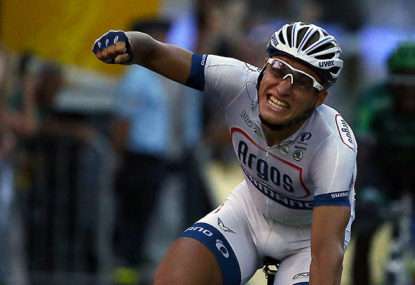'I've just won a stage of the Tour de France, mate!': Hindley grabs yellow jersey as Aussie blows Tour apart
Australia's Jai Hindley has said he is "lost for words" after a shock stage victory at the Tour de France earned him the leader's…

Marcel Kittel provided some of the greatest memories of a wonderful centenary Tour de France, as he ruthlessly dismantled Mark Cavendish’s five-year stranglehold on sprint finishes.
In just his second Tour de France, Kittel won four stages including the showpiece finale on the Champs Elysses, an outcome that was “way more than [he] expected,” despite “a lot of planning and analysing.”
We’d all like to believe what we saw was down to superior planning and no small amount of talent. But in 2013, sadly, predictably, the emergence of new cycling stars is accompanied by question marks as to whether what we’re seeing is ‘real’?
And in Marcel Kittel’s case, he still has some major doubters to overcome, starting with the TV executives in his homeland.
A string of doping confessions by German riders resulted in a black-out of the Tour de France TV coverage, commencing mid-race in 2007 after Patrick Sinkewitz tested positive.
Contractual obligations meant a return to live coverage in 2009, but when those deals were renegotiated in 2012, the Germans weren’t at the table.
And while we can understand why media organisations would be reluctant or simply unwilling to invest millions of dollars into a sport that is clearly struggling for credibility, it is harsh on riders like Kittel that represent the future of cycling.
But apart from pass whatever doping tests they take and speak out candidly against drugs in the media, what else can cyclists do to prove they are clean?
The fact is some people are simply not prepared to believe a thing any rider says when it comes to denying doping.
Perhaps Marcel Kittel is struggling to convince the doubters, because he recently allowed himself to undertake a lie detector test for the German magazine ‘Sport Bild’.
According to the man who supervised the test, Forensic Psychologist Holger Leutz, the results showed Kittel was “clean”.
“The things that we measure during the interview remain very even,” Leutz said.
“This is a sign of credibility.
“Kittel makes us believes in a pure generation of clean cyclists.”
And Kittel was also convinced by the results.
“I have nothing to hide, so I did it,” Kittel said.
“I stand for a clean sport and this test has confirmed it.”
Now I really want to believe Kittel is clean, and on the basis of any evidence to the contrary, we have to assume he is telling the truth.
But can we really believe he is?
Does a lie detector test convince you?
In 2004, barely a month after winning Olympic Gold, Tyler Hamilton was notified about a positive test for blood doping from the Vuelta Espana.
Two days later, he learnt of another positive A-sample test from the Athens Games.
In his book ‘The Secret Race’, Hamilton describes the chaos his life descended into after this double-blow:
“We barely slept, working seven days a week, twelve hours a day, racing through an endless jungle of problems and legal strategies. We hired experts from MIT, Harvard Medical School, Puget Sound Blood Centre, Georgetown University Hospital, and the Fred Hutchinson Cancer Research Centre.
“I travelled to Athens, and got more seemingly useful material—emails from lab techs questioning the tests accuracy.”
And so it went on; “petitioning the UCI” to release Tour de France blood test results and visiting more labs in Lausanne looking for more paperwork.
He learned to lie.
“I’ve always been a hard worker.
“I’ve tested clean dozens of times.
“I even took a lie detector test to help prove my innocence, and passed.”
He passed.
Apparently clenching his buttocks helped beat the test.
Benjamin Koh is a Doctoral Researcher, Complementary and Alternative Medicine at the University of Technology in Sydney.
In March, he co-authored a piece, ‘Lie Detectors and anti-doping, who’s kidding who?‘
To get to the point, he doesn’t believe lie detectors are a real guide to “genuineness”.
“Unfortunately, there is no credible scientific evidence to show any pattern of physiological response is unique to telling the truth or lying.
“Both anxious but honest and non-anxious but dishonest individuals exist. A machine used to detect physiological response is unable to differentiate between the two.
“Moreover, there is evidence to indicate countermeasure strategies used to “beat” polygraph examinations are often effective.
“These may include the use of simple physical movements (such as increasing one’s respiratory rate or by self-inflicting of pain).”
…Butt-clenching, anyone?
He finishes his piece by saying polygraphs are not the answer to solving sport’s doping problems, instead calling for a “better evidence-based policy”.
As I said earlier, the only evidence about Marcel Kittel’s doping status is that he hasn’t failed any tests, so he may well be telling the truth.
Personally, I’m no more suspicious of him as I am of any other rider, and I’ve really enjoyed watching him ride this season.
I do wonder though whether he’ll live to regret undergoing a lie detector test.
Was it a wise or dumb idea? I fall in the latter camp.
Over to you.